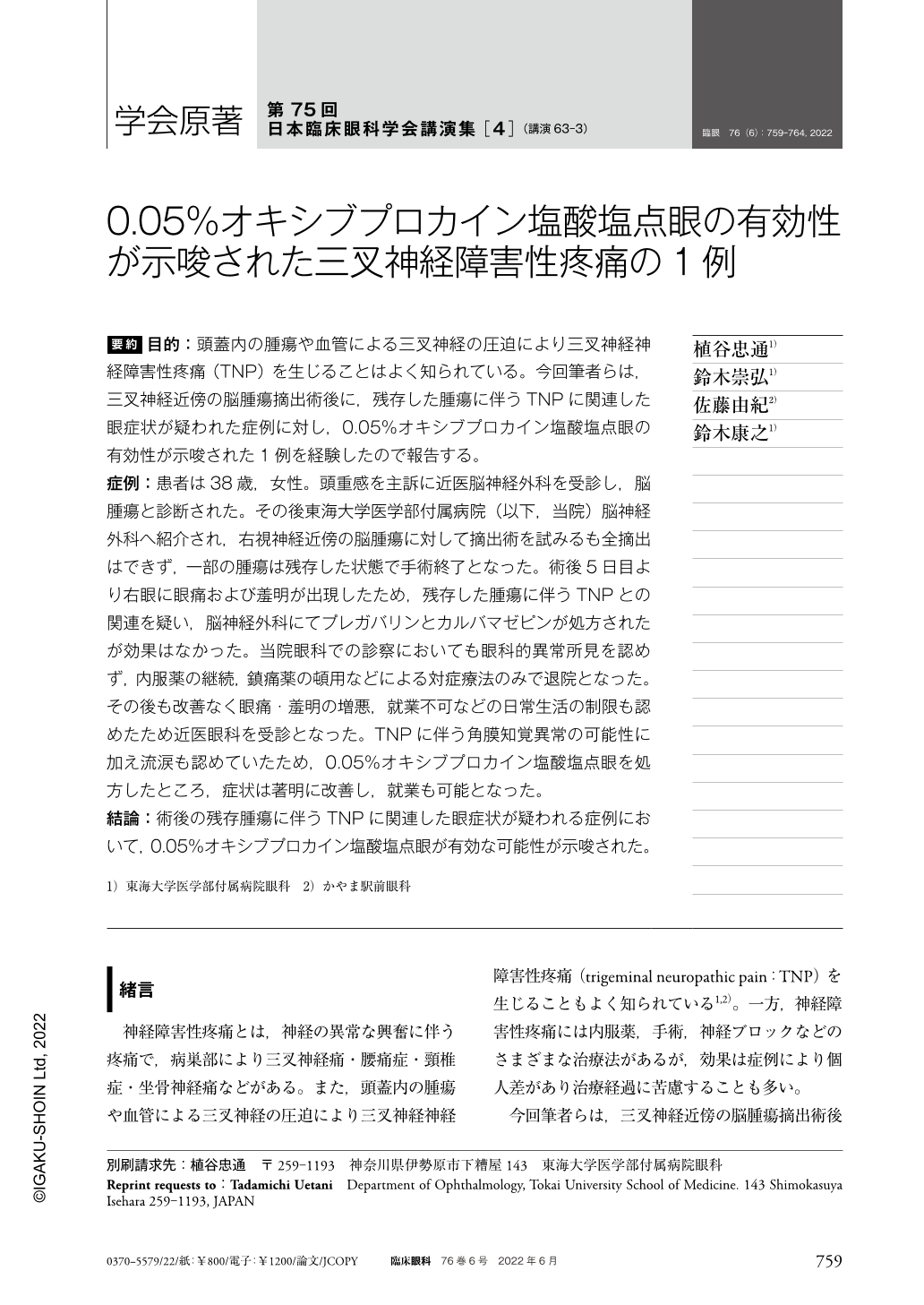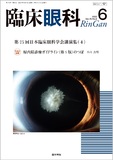Japanese
English
- 有料閲覧
- Abstract 文献概要
- 1ページ目 Look Inside
- 参考文献 Reference
要約 目的:頭蓋内の腫瘍や血管による三叉神経の圧迫により三叉神経神経障害性疼痛(TNP)を生じることはよく知られている。今回筆者らは,三叉神経近傍の脳腫瘍摘出術後に,残存した腫瘍に伴うTNPに関連した眼症状が疑われた症例に対し,0.05%オキシブプロカイン塩酸塩点眼の有効性が示唆された1例を経験したので報告する。
症例:患者は38歳,女性。頭重感を主訴に近医脳神経外科を受診し,脳腫瘍と診断された。その後東海大学医学部付属病院(以下,当院)脳神経外科へ紹介され,右視神経近傍の脳腫瘍に対して摘出術を試みるも全摘出はできず,一部の腫瘍は残存した状態で手術終了となった。術後5日目より右眼に眼痛および羞明が出現したため,残存した腫瘍に伴うTNPとの関連を疑い,脳神経外科にてプレガバリンとカルバマゼピンが処方されたが効果はなかった。当院眼科での診察においても眼科的異常所見を認めず,内服薬の継続,鎮痛薬の頓用などによる対症療法のみで退院となった。その後も改善なく眼痛・羞明の増悪,就業不可などの日常生活の制限も認めたため近医眼科を受診となった。TNPに伴う角膜知覚異常の可能性に加え流涙も認めていたため,0.05%オキシブプロカイン塩酸塩点眼を処方したところ,症状は著明に改善し,就業も可能となった。
結論:術後の残存腫瘍に伴うTNPに関連した眼症状が疑われる症例において,0.05%オキシブプロカイン塩酸塩点眼が有効な可能性が示唆された。
Abstract Purpose:Compression of the trigeminal nerve by intracranial tumors or blood vessels can cause trigeminal neuropathic pain(TNP). We report a case in which oxybuprocaine ophthalmic solution 0.05% was effective in treating suspected TNP-related ocular symptoms associated with a residual tumor after surgery for a brain tumor near the trigeminal nerve.
Case:A 38-year-old woman was diagnosed with a brain tumor after visiting her local doctor with a chief complaint of head heaviness. Subsequently, she was referred to the Department of Neurosurgery at Tokai University Hospital, and we attempted to remove the brain tumor near the right optic nerve;however, we could not remove the entire tumor, and the surgery was completed with some of the tumor remaining. On the fifth day after the surgery, right eye pain and photophobia appeared, and the neurosurgery department prescribed pregabalin and carbamazepine, suspecting that they were related to TNP associated with the remaining tumor, but there was no effect. No abnormal ophthalmological findings were found during the examination at our department, and the patient was discharged after symptomatic treatment with continued oral medication and analgesics. Thereafter, the symptoms tended to worsen rather than improve. She went to a nearby ophthalmology clinic because she couldn't do her job and was forced into inconvenience in her daily life. In addition to the possibility of corneal perceptual abnormalities associated with TNP, tears were also observed, so we prescribed oxybuprocaine ophthalmic solution 0.05%. Her symptoms improved significantly, and she was able to work.
Conclusion:Oxybuprocaine ophthalmic solution 0.05% may be effective in patients with suspected TNP-related ocular symptoms associated with residual tumor after surgery.

Copyright © 2022, Igaku-Shoin Ltd. All rights reserved.


